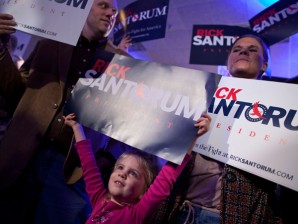DES MOINES—The first vote of the 2012 battle for the White House headed late Tuesday for a nail-biter finish as Iowans picked a Republican standard-bearer to take on President Barack Obama in November.

Zoey McCarty, center, and other supporters of Republican presidential hopeful and former US senator Rick Santorum wait at the Stoney Creek Inn for the arrival of Santorum, where he will find out the final results of the 2012 Iowa caucuses, on January 3 in Johnston, Iowa. Candidates made a final push to try and sway voters as Iowans took part in the first caucus of the 2012 presidential election. AFP
With nearly nine in 10 of Iowa caucus ballots tallied, just a handful of votes separated frontrunner Mitt Romney and surging social conservative Rick Santorum, with veteran Representative Ron Paul hot on their heels.
US television networks showed Romney and Santorum with 25 percent each, Paul at 21 percent, and former House Speaker Newt Gingrich leading the second tier of candidates with about 13 percent of the vote.
After a months-long campaign onslaught — barrages of television attack ads, telephone calls and mailings, candidates blitzing across the state — Iowans headed into hundreds of caucus sites around the mostly rural heartland state.
They gathered in places like school gymnasiums, libraries and church basements to speak out in front of neighbors on behalf of their chosen candidate to battle Obama in the November 6 elections and then vote by secret ballot.
The Iowa caucuses came against the backdrop of a sour, job-hungry US economy that weighs heavily on the embattled Obama’s bid for a second term, four years after he promised “hope and change” in his historic 2008 victory.
The president, in a message beamed to Democrats holding their own caucuses across this mostly rural state, pleaded with them to stick with him, saying: “Change is never easy.”
“The problems that we’ve been dealing with over the last three years, they didn’t happen overnight and we’re not going to fix them overnight. But we’ve been making steady progress as long as we can sustain it. And that’s what this is going to be all about,” he said.
But Romney, a former Massachusetts governor and millionaire venture capitalist, promised cheering supporters at a rally in Des Moines, Iowa’s capital: “I will get America working again!”
The quirky process does not directly award delegates to the party’s nominating convention this summer, and its strength lies in its timing: It can set the tone for the rest of the state-by-state battle, lift or bury a sagging campaign, and add luster to a shining presidential prospect.
Santorum, a former US senator who surged in Iowa after once being given up as politically dead, predicted on ABC television he would “do very well” here and then carry that momentum into New Hampshire’s January 10 primary and then “pour it on” in South Carolina on January 21.
Romney has made little secret that he hopes for a strong finish in Iowa, a romp in New Hampshire, and another success in South Carolina, that may give him a lock on the nomination months before the general election.
Paul’s unorthodox libertarian views have earned him a devout following, but he is seen as uncompetitive in other states, while Santorum, 53, faces an uphill fight to match Romney’s massive national organization.
Still, while Romney’s massive campaign warchest and high-profile endorsements have fed his image as the candidate to beat, he faces stubborn doubts about his conservative credentials, as well as his Mormon faith, and has been unable to increase his support among Republican voters nationwide above 30 percent.
Paul, 76, a small-government champion, has stumped heavily in his opposition to foreign aid and military interventions overseas
“Most of the rest of the Republican field seems to be a little bit over eager to use nuclear weapons and to bomb other countries,” Republican Senator Rand Paul, the candidate’s son, told CBS television.
The candidates made a final blitz across Iowa, mindful that the winning margin in the 2008 caucus was 10,000 votes out of just 120,000 cast — a fraction of Iowa’s two million registered voters.
“It’s very fluid,” Representative Michele Bachmann, a long-shot candidate, told CNN. “There’s a long way to go. I have a lot of staying power.”
“We are going to take America back. That’s what this is about. It is a powerful moment in America’s history. And you are on the front lines,” Texas Governor Rick Perry, who also lags in the polls, told volunteers.
Iowa — where unemployment is well below the national average — is also an unreliable predictor of presidential fortunes: Senator John McCain, the eventual nominee in 2008, came in fourth that year.
Former US envoy to China Jon Huntsman skipped Iowa in favor of focusing on New Hampshire, where Romney enjoys a considerable lead.